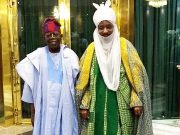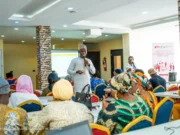By Mustapha Ridwan O
Introduction

ISLAM — The alarming rise of vituperation and indecency among Muslims on social media is a significant concern. Social media, which should serve as a platform to extend the message of Islam and showcase the beauty of the religion, has instead become a space where some members of the Muslim community engage in blackmail, insults, and slander—disrespecting even elders.
This troubling behavior not only tarnishes the image of Islam but also contradicts the values the faith upholds regarding respect and dignity.

While this issue is not limited to Muslims alone, as it cuts across other religious communities, the extent to which it affects some Muslim brethren is particularly concerning.
The porosity of social media is damaging to the country and undermines the potential of these platforms to be spaces of constructive discourse.
This article intends to shed light on the Islamically unruly activities of some Muslims online and call upon Islamic leaders to collaborate with governmental authorities in creating a set of regulations that guide social media usage.
There is an urgent need for stricter monitoring and censorship to safeguard not only the reputation of Islam but also the moral fiber of the digital Muslim community.
At times, I find myself questioning whether these brethren are being sponsored against one another, as the situation appears deeply troubling. Without intervention, the growing toxicity threatens the harmony and values that Islam seeks to promote.
Islamic Teachings on Social Etiquette (Ādāb al-Mu‘āshirah)
Social etiquette is essential for fostering unity within a society. Its significance has been emphasized throughout history, and in today’s world, the need for proper conduct is more pressing than ever.
Islam places great importance on social manners, highlighting the values of universal brotherhood and harmony within communities.
Both the Qur’an and Sunnah are filled with teachings on Ḥusn al-Mu‘āshirah (best social behavior), emphasizing the adoption of exemplary conduct.
One of the distinctive features of Islam is that when it encourages good behavior, it also provides motivation and clear guidance on how to practice it. This extends to all forms of social interaction, whether in person or online.
The importance of maintaining decorum, mutual respect, and proper behavior in social engagements, both face-to-face and in the digital world, cannot be overstated.
The lack of these qualities often leads to disunity and hostility, undermining the bonds of love and mutual respect that are crucial to a harmonious society.
Bangladesh Lifts Ban on Jamaat-e-Islami
The spread of negative behavior—such as poor social etiquette—results in ill feelings, animosity, and disconnection among individuals.
Islamic social etiquette is grounded in several key principles: avoiding harm to others, fulfilling duties and responsibilities, and encouraging forgiveness and humility.
Muslims are called to respect and serve one another, especially elders, while promoting simplicity in their lifestyle to maintain modesty and focus on fulfilling the rights of others. Pride is discouraged, and humility is essential for fostering unity and harmony within society.
“O you who have believed, let not a people ridicule [another] people; perhaps they may be better than them. Nor let women ridicule [other] women; perhaps they may be better than them. And do not insult one another and do not call each other by [offensive] nicknames. Wretched is the name of disobedience after [one’s] faith. And whoever does not repent – then it is those who are the wrongdoers.” (Quran 49:11)
Muslims are thus urged to avoid imitating the practices of non-believers that contradict Islamic values, adhering instead to the teachings of Islam in all aspects of life.
These principles guide interactions both in person and in the digital world, emphasizing respect, decorum, and brotherhood.
Unruly Behavior on Social Media Among Muslims
In recent times, the use of social media by some Muslims, particularly on platforms like Facebook, has shown worrying trends. Instead of fostering unity or respectful dialogue, some have engaged in personal attacks under the guise of correcting perceived theological errors.
Individuals defend their scholars fiercely, treating their views as final on Islamic matters. Others go as far as declaring who is destined for hell or paradise based on their interpretations.
The misuse of social media has led to destructive outcomes. In the past year or two, there have been cases where Muslims have taken each other to court for defamation, particularly involving elder scholars, some of whom have already passed away.
One notable incident involved a Muslim arrested after Hajj for falsely accusing prominent Southwest scholars of being linked to Boko Haram. Despite multiple interventions, the refusal to retract his statement led to legal consequences.
Another example is the case of a female Muslim preacher in Ibadan whose personal matters were exposed online, alongside baseless accusations of illicit activities, without the necessary Shariah-compliant witnesses.
More disturbing is a scholar publicly suggesting that graduates of Islamic schools could use charm to marry daughters of powerful figures for social advancement.
These actions, alongside others, contribute to the growing wave of unruly behavior on social media, which must be addressed before it further harms the unity and reputation of the Muslim community.
Consequences of Online Misconduct: Impact on the Ummah and Society
The consequences of online misconduct among Muslims are becoming increasingly apparent, with growing animosity not only within the Muslim community but also affecting how non-Muslims perceive Islam.
This behavior undermines the sanctity of the brotherhood that Islam promotes. For example, when Mudeer Markaz fell ill, some wished for his death merely because he held differing views.
Similarly, at the funeral of a prominent comparative preacher’s father, arguments broke out over online disputes, turning what should have been a moment of solace into a contentious debate.
These incidents illustrate how online misconduct is eroding the unity of the Muslim Ummah and diminishing the respect once held for Islamic scholars. Young scholars sometimes indulge in inappropriate behavior for attention, while even non-religious individuals feel compelled to correct Muslim scholars on religious matters.
One glaring example is a leading figure in the Qādiriyyah Sufi Order who publicly urged students of Arabic and Islamic schools to use charms to marry wealthy individuals’ children, which led to widespread mockery of Muslims.
In addition, a doctor once urged his congregation to scatter and forcefully disrupt the gatherings of Tableegh members, claiming that their activities had no basis in Islam according to his view.
These instances only further divide the community, weaken the bonds of brotherhood, and cause society to question the peaceful nature of Islam due to such divisive actions and rhetoric.
Islamic Leadership and the Need for Regulation
Islamic leadership in Nigeria must urgently address the growing misconduct of some Muslim brethren on social media, which increasingly tarnishes the image of Islam and its leadership.
The disruptive use of social media to spread animosity and defame others contradicts the fundamental teachings of Islam, requiring immediate intervention.
The National Supreme Council for Islamic Affairs (NSCIA), alongside bodies like the League of Alfa and Imams (Rabitah) and Muslim Ummah of South West Nigeria (MUSWEN), should collaborate to curb these issues, drawing lessons from countries like Saudi Arabia, Malaysia, and the UAE, where ethical digital engagement is emphasized as part of broader societal values.
By doing so, they can address these challenges before the situation worsens.
Conclusion
The unregulated nature of social media has allowed individuals with differing views to defame, slander, and bully others, often leading to deep-seated animosity within the online Muslim community.
This behavior has even resulted in legal actions, with some brethren being arrested for allegations of fraud, slander, or defamation.
Unfortunately, many individuals refuse to accept correction when advised with wisdom, believing that social media is a “free world.” These ongoing issues highlight the urgent need for Islamic leaders to step up and regulate online behavior, particularly regarding hate speech and misconduct.
The NSCIA must collaborate with the government to implement these regulations, preserving the image of Islam and promoting unity within the Muslim Ummah.
NOTE: Image use for illustration only.




































We are in an era individuals (including Muslims) prioritize money making through social media over the effect its misuse can have on the larger society.